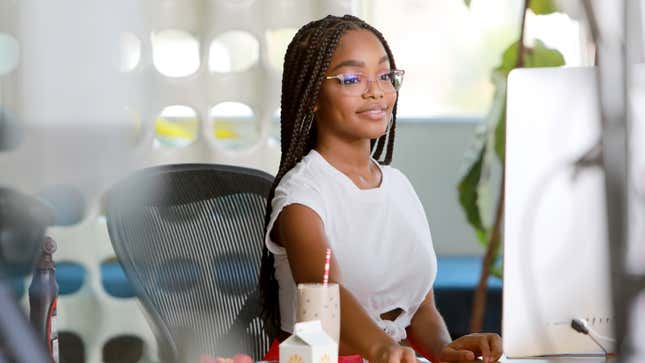
Marsai Martin has made quite the mark in Hollywood and she’s making sure it matters.
Martin, who is the youngest executive producer in Hollywood history (causing me to dub her “Yung EP”), recently celebrated her two NAACP Image Awards during the 52nd annual ceremony. The 16-year-old actress and creative mogul won Outstanding Performance by a Youth (Series, Special, Television Movie or Limited–series) and Outstanding Supporting Actress in a Comedy Series (each, for her work in Black-ish), which means she now has a total of 11 Image Awards.
In a recent interview with The Hollywood Reporter, Martin discussed what the Image Award wins mean to her as well as the types of projects she wants to create via her production company, Genius Entertainment.
“I have a couple of rules when you come into my office,” Martin noted. “When you come into my office, don’t give me this—I don’t do no Black pain. If it’s Black pain I don’t go for it because there’s so many films and projects about that, so that’s not who I am.”
The quote is timely as the Black community has had an ongoing conversation and debate about Black trauma and the exploitation of said trauma in television and film, which most recently resurfaced with the official trailer release of Little Marvin’s Them. The term “trauma porn” is typically tossed around, though trauma is a part of horror projects, historically. It’s clear that the adverse reaction stems from fatigue drawn from a barrage of modern real-life trauma, as well as a severe creative lack of Black-led stories...at least on a mainstream level.
That distinction is important to point out; this is not a shortcoming of Black creators—there is certainly a diverse pool of Black writers and filmmakers swimming with ideas, pitch decks, scripts, footage and more just waiting to be financed and distributed. Black Film Twitter alone has shown that. This is actually the laziness of Hollywood gatekeepers who refuse to expand beyond the status quo.
Earlier this month, Martin’s newly produced project Saturdays received a pilot order from the Disney Channel. The single-camera comedy series made waves throughout Black Twitter, specifically because it centered around a dark-skinned Black girl (portrayed by Danielle Jalade) with sickle cell disease who participates in competitive roller skating. Using this series as an example, Martin is able to expound on what she means by her “no Black pain,” rule—it’s not as simple as erasing the very real pain Black people experience, it’s more so about not exploiting it and still celebrating the person behind the pain.
“We’ve been working on it for quite a while now,” Martin said about the upcoming project. “I’ve always wanted to have just a cool activity that like us Black people love—like everyone loves it but the aesthetic of roller skating is just amazing and it just doesn’t get the recognition that it needs. I just wanted to shine a light on it. Then also, sickle cell is a very big thing in our Black community, it tackles us the most. It’s never been seen on TV or film before so I wanted to make sure this was a moment to shine a light on it—in not a bad way because we don’t do Black pain, but to where our main character is still celebrated, still loved and lives her life the way that she wants to.
“It’s just very fun and very exciting,” she continued. “We’re just bringing back the Disney Channel era that I grew up watching with That’s So Raven and Good Luck Charlie, the shows that I love, and I wanted to bring that back in a way where everyone can watch it, not just the kids, but the family. It’s our humor; I’m excited for it.”
Overall, Martin wants to create projects that have a legacy and can span generations.
“I want to make sure that it is diverse and real in its own way,” she said. “I know a lot of people don’t like the word “authentic,” but I just love real stories that people can resonate with, even when it doesn’t resonate with you personally but you know a friend who’s dealt with that or families. And I love a good plot twist because it gets me every time, just something that is real and something that you can grow up watching, tell your kid’s kids about it and just having those moments because I mean, I love old school stuff. I’m an old soul, so I grew up watching the films that my grandma was watching. So having something like that to where my kid’s kids can watch something and still love it is something that I want to do.”
We have a very strong feeling your stories will do just that, Marsai!



